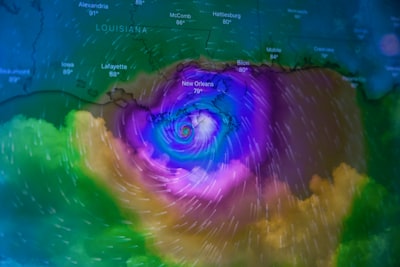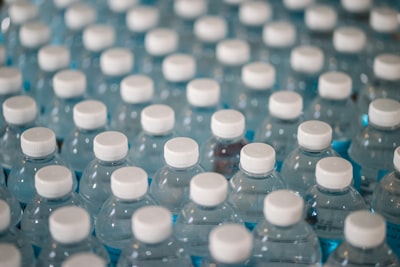Building the best hurricane preparedness list of food and supplies begins with you...
Hurricane season is fast approaching, and it's crucial to be prepared for the worst. One of the most important aspects of hurricane preparedness is having a well-stocked pantry with non-perishable items that can last you through tropical storms. In this blog post, we will provide you with an updated list of all essential food items you should have on hand in case of a hurricane. We'll also discuss how hurricanes can impact our food and water supply, and why staying hydrated during and after a hurricane is crucial for your safety. Additionally, we'll cover other essential items like first-aid kits, medication, IV drink powder, portable generators, and cleanup supplies that you need to stock up on before a hurricane hits. So buckle up and read on to make sure that you're fully equipped to weather the storm!
Understanding Hurricanes and Their Impacts
Hurricanes, characterized by powerful winds, heavy rainfall, and storm surges, can cause widespread damage. Understanding their impacts is crucial for better preparation and response. Scientists study past hurricanes to improve forecasting and tracking techniques. It's important for individuals and families to have a plan in place for hurricane preparedness. By comprehending the destructive nature of these storms, communities can mitigate risks and protect themselves.
The Basics of Hurricanes
Hurricanes, powerful tropical cyclones that form over warm ocean waters, are classified into different categories based on wind speeds. They bring high winds, heavy rain, and storm surges, causing severe weather conditions. The National Hurricane Center provides alerts and updates on developing storms, so it's important to stay informed. During hurricane season, following evacuation orders and having an emergency supply kit, including items like hand sanitizer and a fire extinguisher, is crucial. By understanding the basics of hurricanes, we can better prepare for their impact.
How Hurricanes can affect our Food and Water supply
Hurricanes have the potential to disrupt the food and water supply chain, leading to shortages. Power outages can make it challenging to keep perishable food refrigerated, highlighting the importance of having a supply of non-perishable food and drinking water. It is also recommended to have a waterproof container for food storage. Additionally, storing extra batteries and chargers for electronic devices is essential for staying connected during severe weather events.
Why Hydration is key during Hurricanes
Proper hydration is essential during and after hurricanes. Dehydration can lead to fatigue, dizziness, and other health issues. To maintain hydration levels, it is crucial to consume electrolyte-filled drinks. Additionally, having a sufficient supply of drinking water is important for overall well-being and health. By prioritizing hydration, individuals can better endure the challenges of severe weather conditions. Stay prepared and stay hydrated.
The Importance of staying Hydrated during and after a Hurricane
Proper hydration is vital for physical and cognitive function, especially during and after a hurricane. Drinking enough water helps prevent heat exhaustion and heatstroke, which can be common in the aftermath of a storm. Additionally, hydration is essential for the immune system and digestion. It's recommended to drink water even if you don't feel thirsty to maintain optimal hydration levels and minimize the risk of dehydration-related health issues. Remember to stay hydrated for your overall well-being.
Role of Electrolyte-filled drinks in maintaining Hydration
When it comes to maintaining hydration, electrolyte-filled drinks play a vital role. These beverages can replenish essential minerals lost through sweat and aid in rehydration. Especially during hot weather or physical exertion, electrolyte-filled drinks are particularly beneficial. They help prevent muscle cramps and fatigue. However, it's important to choose drinks without excessive sugar or caffeine for optimal hydration. Make sure to include these beverages in your emergency supply kit for maximum hydration during severe weather conditions.
What should your Hurricane Food Preparedness list look like?
Planning your Hurricane Food Preparedness list is crucial. Ensure you have a well-stocked supply of non-perishable food items. Ready-to-eat meals provide convenience and nutrition during emergencies. Store your food in a safe, dry place to prevent contamination. Remember to include a variety of food items that meet dietary needs and regularly check expiration dates.
A Checklist: Essential Non-perishable food items to stock up on
When preparing for a hurricane, it's important to have a supply of essential non-perishable food items such as:
- Canned goods like vegetables, fruits, and proteins are great options as they have a long shelf life. Here's a great checklist below:
- Canned vegetables (e.g., corn, green beans)
- Canned fruits (e.g., peaches, pineapple)
- Canned proteins (e.g., tuna, chicken)
- Peanut butter and jelly
- Dried fruits and nuts
- PRO TIP: Remember to check expiration dates regularly and rotate your stock to ensure freshness.
- Dried foods such as pasta, rice, and beans are also good choices. Here's some detail you can chart out below:
- Pasta: Choose varieties like spaghetti, macaroni, or penne that have a long shelf life. They can be easily cooked and paired with canned sauces or vegetables for a filling meal.
- Rice: Opt for long-grain or instant rice that can be cooked quickly with minimal resources. Rice is versatile and can be served as a side dish or used as a base for stir-fry or casseroles.
- Beans: Stock up on different types of beans such as black beans, chickpeas, and kidney beans. They are high in protein and provide sustenance in meals like chili, burritos, and soups. Beans are also an excellent source of fiber and can help keep you feeling full and satisfied during a hurricane situation.
- Convenience and nutrition can be found in nut butter, granola bars, and crackers.
- Nut butter, such as peanut butter or almond butter, is a great option to have on hand during a hurricane. Packed with protein and healthy fats, nut butter can be spread on crackers or used as a dip for fruits and vegetables. It's a convenient and nutritious snack that provides long-lasting energy.
- Granola bars are another essential non-perishable food item to include in your hurricane preparedness list. Look for bars that are high in fiber, low in sugar, and made with whole grains and nuts. They make for a quick and easy snack when you need a boost of energy.
- Crackers are a versatile and convenient option for hurricane preparedness. They can be enjoyed on their own or paired with spreads like nut butter or cheese. Look for whole-grain crackers that provide fiber and nutrients to keep you satisfied during an emergency situation.
- Shelf-stable milk and powdered drinks provide essential nutrients.
- In addition to filling meals, it's important to include shelf-stable milk and powdered drinks in your hurricane preparedness list. Shelf-stable milk, such as UHT or evaporated milk, can provide essential nutrients like calcium and vitamin D, even during a power outage. Powdered drinks like electrolyte mixes can help keep you hydrated in case clean drinking water becomes scarce.
- When selecting shelf-stable milk, choose options that have a long shelf life and are suitable for your dietary preferences. Powdered drink mixes should be high in essential electrolytes and easy to mix with water.
And, don't forget to include a manual can opener in your emergency kit as you'll likely need it to get at the goodies later on!
Importance of having Ready-to-eat Meals
During a hurricane or other severe weather events, having ready-to-eat meals is of utmost importance. These meals require no cooking or refrigeration, making them incredibly convenient during emergencies. They provide essential nutrients and calories for sustenance, ensuring that you have the energy to navigate through challenging situations. Ready-to-eat meals come in a variety of options, including vegetarian and gluten-free, catering to different dietary needs. With their long shelf life and sealed packaging, they can be safely stored and easily accessible even if cooking facilities are unavailable.
How to safely store your food during a hurricane
During a hurricane, it is crucial to safely store your food to prevent contamination and damage. Use airtight plastic bags or containers to keep your food fresh and protected. Place your food on higher shelves or elevated surfaces to avoid water damage. Remember to use waterproof labels to identify the contents and expiration dates. Keep disposable plates, cups, and utensils on hand for easy cleanup. If power outages are anticipated, consider having a cooler with ice packs for perishable items.
How to make sure you have enough water during a hurricane
During a hurricane, it is crucial to have an ample supply of drinking water. Make sure to stock up on enough water to meet your family's needs. Purify the water using appropriate methods to ensure it is safe for consumption. Store the water in a safe and easily accessible location. Consider the water requirements of all family members, including pets. Stay informed about the status of local water sources during the hurricane.
Safe storage and purification of water for use during a hurricane
During a hurricane, it is crucial to have safe and clean water. Use airtight plastic bags or waterproof containers to store water, ensuring it remains uncontaminated. Follow purification guidelines provided by authorities like the CDC to ensure the water is safe for consumption. Keep extra batteries on hand for water purification devices. Clean containers with disinfectants before storing water and regularly monitor the water quality. Remember, safe storage and purification of water are essential for your well-being during a hurricane.
What else can be done to prepare for a hurricane besides stocking food and water?
In addition to stocking up on food and water, there are several other important steps you can take to prepare for a hurricane. Gather an emergency supplies kit with essential items, understand the difference between a hurricane "watch" and "warning," keep important documents in a waterproof container, and stay updated with information from reliable sources like the National Hurricane Center or local emergency management agencies.
1 | Gather emergency supplies.
As you prepare for a hurricane, it's crucial to gather emergency supplies. Make sure to include some recommended items such as non-perishable food and water in your kit to sustain you during the storm. Additionally, pack a first-aid kit with essential medical supplies and ensure you have enough medication for the duration of the hurricane. Having a portable generator as a backup power source and extra cash on hand are also important. Having your cell phone charged is key to any scenario as well! Be prepared for any situation that may arise during severe weather including downed power lines, closed gas stations, and even having enough sleeping bags for your family to huddle in one room of your home (or another safe place) is damaged or flooded.
2 | Know the difference between a hurricane “watch” and “warning.”
Understanding the difference between a hurricane "watch" and "warning" is crucial for effective hurricane preparedness. A hurricane "watch" indicates that conditions are favorable for a hurricane to occur within the next 48 hours. On the other hand, a hurricane "warning" means that a hurricane is expected to hit in the next 36 hours, and immediate preparedness measures should be taken. It's important to stock up on non-perishable food items, such as canned goods and energy bars, and plenty of water and electrolyte beverages to stay hydrated during the storm. It is essential to understand the meaning of different hurricane conditions, such as a hurricane watch or warning. A great resource for learning more about weather conditions in the tropics is Mike's Weather Page. Check out this YouTube channel or watch the video below for more information:
3 | Water containers
When preparing for a hurricane, it's important to have a sturdy and airtight water container. Choose one that is large enough to meet your household's water needs. Store the container in a safe and easily accessible location. Regularly check and maintain the container to prevent leaks or contamination. Additionally, consider having multiple water containers for different purposes like drinking, cooking, and hygiene. Having an ample supply of clean water is crucial during severe weather events - not just for drinking, but also for washing as well.
4 | First-Aid Kit
Include essential first-aid supplies in your emergency kit, such as bandages, pain relievers, and antiseptic ointments. Don't forget to include any necessary prescription medications as well. It's important to regularly check and replenish your first-aid kit to ensure it's up to date. Also, take the time to familiarize yourself with basic first-aid procedures for common injuries. Being prepared with a well-stocked and updated first-aid kit can make a difference in a hurricane or other emergency situations.
5 | Medications
To ensure preparedness, it is crucial to have an ample supply of necessary prescription medications during a hurricane. Additionally, pack over-the-counter medications like pain relievers and antihistamines for common ailments. Remember to store all medications in a cool and dry place to maintain their effectiveness. Keeping a list of all medications and their dosages for easy reference is also recommended. Lastly, consider including a small first-aid manual in your emergency supply kit for guidance in case of any emergencies. Additionally, personal hygiene items are an essential part of any hurricane preparedness list. This includes items such as soap, shampoo, toothpaste, and toilet paper. It's important to have enough supplies to last at least a few days in case of extended power outages or limited access to stores. Feminine supplies should also be included in the kit. Additionally, it's a good idea to have hand sanitizer and disinfectant wipes on hand for maintaining cleanliness during an emergency situation.
6 | Portable generator
Having a portable generator as a backup power source during a hurricane is essential. It's important to follow safety precautions and operating instructions for the generator to prevent any accidents. Keep extra fuel on hand to ensure that the generator can run for an extended period. Regularly maintain and test the generator to make sure it's in working condition. Always use the generator in a well-ventilated area away from windows and doors to avoid carbon monoxide poisoning.
7 | Get your family and pets ready.
Ensure the safety of your loved ones and furry friends by creating an emergency plan. Establish evacuation routes and designate meeting points in case you get separated. Prepare a disaster supplies kit for each family member, including essential items like food, water, and medication. Don't forget to include necessary supplies for your pets as well. Teach your family members how to safely shut off utilities during emergencies. Practice your emergency plan together to ensure everyone knows what to do.
8 | Home readiness.
To ensure your safety during a hurricane, there are several steps you can take to prepare your home. Start by securing loose objects that could become dangerous projectiles in high winds. Trim trees and shrubs to minimize the risk of falling branches. Reinforce windows and doors to protect against strong winds. Consider having a generator as a backup power source in case of an outage. Additionally, stock up on non-perishable food and water to sustain you for at least three days.
9 | Get your car ready.
Ensure your car is prepared for a hurricane. Keep the gas tank at least half full for evacuation purposes. Check tire pressure and condition to ensure safe travel. Pack a roadside emergency kit with tools, jumper cables, and a spare tire. Don't forget to have a map or GPS device in case alternative routes are necessary. Lastly, safeguard important documents and contact information in a waterproof container.
10 | Be ready to evacuate or stay.
Follow evacuation orders from local authorities to prioritize your safety. Create a plan for where to go and how to communicate with family members. Pack essential items like clothing, medications, and personal hygiene products. Stay informed about the storm's progress through official sources like the National Weather Service. If staying at home, designate a safe space away from windows and stock up on necessary supplies. Be prepared for any situation that may arise during severe weather conditions.
11 | Withdraw extra cash.
In the event of a hurricane, it's crucial to withdraw extra cash. During such severe weather, ATMs and banks may become inaccessible, and credit card machines may not work due to power outages. Having cash on hand allows you to purchase essential items and services when needed. To make transactions easier, ensure you have small bills. It's also advisable to keep some cash in a waterproof container for added protection.
12 | Get cleanup supplies.
To ensure a smooth post-hurricane cleanup process, it's important to have the necessary supplies on hand. Be prepared with an ample supply of garbage bags for easy disposal of debris. Keep disinfectant wipes or spray available for cleaning surfaces and preventing the spread of germs. Stock up on paper towels for quick and efficient cleanups. Don't forget to have a broom, dustpan, and mop ready for tidying up after the storm. And finally, make sure to have a supply of airtight plastic bags for storing wet items safely.
Frequently Asked Questions
What are 10 key things you need to prepare for a hurricane?
Here are 10 essential items to have for hurricane preparation: non-perishable food like canned goods and granola bars, clean water (at least one gallon per person per day), a first aid kit with necessary medical supplies and medications, flashlights, batteries, a portable radio, extra cash, and ample pet food and supplies.
What Should You Do Before a Hurricane?
Before a hurricane hits, it is crucial to stay informed about its progress and follow any evacuation orders. Be prepared with an emergency kit containing essential supplies for at least three days. Secure your home by boarding up windows, trimming trees, and securing loose objects. Lastly, review your insurance policies to ensure adequate coverage.
What Should You Do During a Hurricane?
During a hurricane, it is important to follow the instructions and advice of local authorities. Stay indoors, away from windows and doors. Have an emergency kit with essential supplies like food, water, and medications. Stay updated on weather conditions and be prepared to evacuate if necessary.
How far in advance should you start preparing for a hurricane?
It is advisable to start preparing for a hurricane at least one week before it hits. Begin by stocking up on non-perishable food items and water. Create an emergency kit with essential supplies like first aid, batteries, flashlights, and a portable radio. Don't forget to secure your home and evacuate if necessary.
What are some common mistakes people make when preparing for a hurricane, and how can they be avoided?
Common mistakes in hurricane preparation include last-minute shopping and underestimating storm severity. Avoid these by stocking supplies early and staying updated on weather forecasts. Also, ensure you have enough non-perishable food items, a plan for pets and medications, and important documents ready.
How can you stay informed about the latest updates and developments related to an approaching hurricane?
Stay updated on the latest hurricane information by tuning in to local news and weather reports. Follow the official social media accounts of organizations like the National Hurricane Center or FEMA.gov. Sign up for emergency alerts from your local government via text or email. Have a plan for evacuation or sheltering in place.
Conclusion
In conclusion, preparing for a hurricane goes beyond just stocking up on food and water. It requires a comprehensive approach that includes gathering emergency supplies, knowing the difference between a hurricane "watch" and "warning," and making sure your family, pets, home, and car are ready. Additionally, having extra cash on hand, as well as cleanup supplies, can be crucial in the aftermath of a hurricane. By following these steps and being proactive in your preparedness efforts, you can better protect yourself and your loved ones during this natural disaster. Stay safe and stay prepared.
DISCLAIMER: THIS WEBSITE DOES NOT PROVIDE MEDICAL/HEALTH/DISASTER PREPAREDNESS ADVICE
The information, including but not limited to, text, graphics, images, and other material contained on this website are for informational purposes only. No material on this site is intended to be a substitute for professional medical/health/disaster preparedness advice, diagnosis or treatment. Always seek the advice of your physician or other qualified health care provider or government entity with any questions you may have regarding a medical condition or treatment and before undertaking a new health care regimen or disaster plan, and never disregard professional/local state & law enforcement/emergency agency advice or delay in seeking it because of something you have read on this website.






